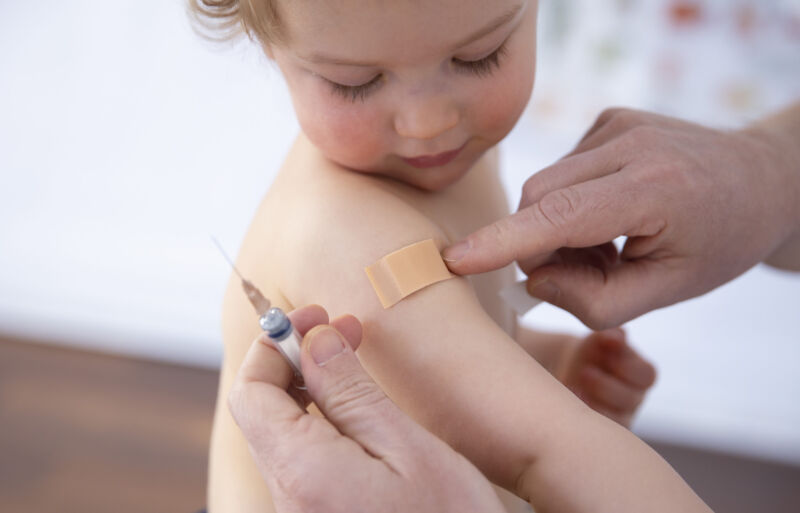
Update 1/31/2022, 10:15pm ET: Pfizer and its partner BioNTech are expected to submit a request to the Food and Drug Administration as early as Tuesday, February 1, for emergency authorization of a two-dose COVID-19 vaccine for children ages six months to four years, according to officials familiar with the situation who spoke with the Washington Post and the New York Times. According to the Post, FDA officials encouraged Pfizer and BioNTech to submit the request and data in hopes of authorizing the two doses as early as the end of February. Meanwhile, the companies will continue to collect data on a third dose for the age group.
The original story follows.
Original story 1/31/2022, 5:21pm ET: The Food and Drug Administration may be reconsidering its criteria for authorizing COVID-19 vaccine doses for children under age five, according to Scott Gottlieb, a former FDA commissioner and a current board member of vaccine-maker Pfizer. This opens the possibility that vaccine-ineligible youngsters could get protection from severe COVID-19 sooner than anticipated.
In an interview Sunday, Dr. Gottlieb told CBS’s Face the Nation that he sensed a shift in federal health officials’ thinking on the younger group. “And I’m hopeful that you could see some movement on trying to entertain that application earlier,” he said. “Ultimately, the decision resides with FDA, but there is some indication that there may be an early reaction on that application.”
If Gottlieb’s inkling is correct, vaccines could begin going into little arms as soon as March.
For now, vaccine authorization for children aged six months to four years is on hold as vaccine makers and regulators await more clinical trial data. Last month, Pfizer and its partner BioNTech announced that, although two doses of vaccine formulated for children are safe, the jabs did not produce the same high levels of immune responses seen in older age groups given the vaccines. The young children’s formulation is a 3-microgram dose of the vaccine. The same vaccine is given at 30-microgram doses in adults and 10-microgram doses in children ages 5 to 11. With the inferior immune responses in younger children, the companies announced they would add a third 3-microgram dose—given at least two-months after the second dose—in an attempt to boost levels of protection.
The third dose adds months onto the timeline of when the vaccines may be up for FDA authorization—and prolongs the agony of the parents and caregivers of unvaccinated young children. Pfizer and BioNTech said last month that they could submit data to the FDA sometime in the first half of this year. Before the setback, there was hope that regulators could be reviewing such data at the start of 2022.
Safe and effective
But in his interview Sunday, Gottlieb told Face the Nation host Margaret Brennan that the “decision matrix” around the authorization may be changing. Previously, the goal was that vaccines would prevent infection, Gottlieb noted. Early clinical trials in adults found remarkably high levels of protection from infection, and that was the benchmark and the reasoning behind adding a third dose to the children’s trial. But with the rise of the omicron coronavirus variant—which can evade some immune responses—vaccines are no longer expected to stop infections at high rates. Instead, their strength is to provide and maintain strong protection against severe COVID-19 cases, hospitalization, and death. That shift lessens the need for that third dose in younger children, Gottlieb argued.
“Now, if the goal of the vaccine is to get baseline immunity in the kids to prevent really bad outcomes, and you’re really not using the vaccine as a tool to prevent infection in the first place, two doses could do that,” Gottlieb said. “Getting two doses into a child can provide baseline immunity that protects them from severe disease, from hospitalization. And I think that may be why federal health officials are rethinking this if, in fact, they decide to authorize this on the basis of two doses.”
In an email to Ars, the FDA said it cannot confirm or comment on interactions it’s having with the vaccine makers. When Ars reached out to Pfizer, a company representative indicated that there were no updates it could share yet on vaccines for children under five.
In a White House press briefing last Wednesday, top infectious disease expert Anthony Fauci indicated that he was still expecting a three-dose regimen but noted that he hadn’t seen any of the data that Pfizer is sharing with the agency. He emphasized that the FDA is “very scrupulous” and that if and when vaccine doses are approved for the younger age group, “we can be certain that [the vaccines] will be safe and that they will be effective.”
https://arstechnica.com/?p=1830733

